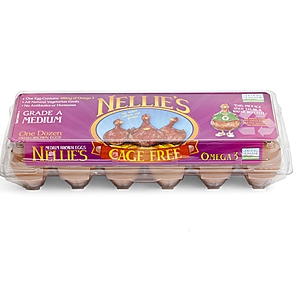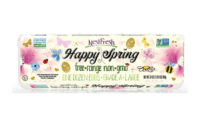Nellie’s Nest cage-free eggs, produced and packed by Pete and Gerry’s, LLC, Monroe, N.H., received a fresh new look.
Refrigerated & Frozen Foods’ editor-in-chief Marina Mayer talks exclusively with David Rachlin, executive vice president, marketing and business development to  learn more about the new packaging and what benefits it offers consumers—and the Earth.
learn more about the new packaging and what benefits it offers consumers—and the Earth.
Refrigerated & Frozen Foods: Why the new packaging?
David Rachlin: We’ve been learning from consumers that more and more of them care deeply about where their eggs come from and how humanely the hens that lay them are treated. We decided that now, rather than later, is the best time to start telling the stories of our small family farmers on our cartons, where every shopper who examines our eggs on grocery shelves and purchases our eggs will see it. Furthermore, keeping small family farmers working their lands, sustaining their rural communities and preserving agricultural landscapes is a mission that Jesse LaFlamme, chief executive officer, deeply believes in and has embedded in our company’s DNA and our values-led sourcing. Our new packaging features a picture and profile story about one of our 59 small family farmers on the inside of every carton, and one variation even features Jesse communing with a barn full of our cage-free hens. In addition to providing safe nutritious foods, small family farmers live on their farms and are the best stewards of the environment for future generations. And, because they have a vested interest in the vitality of their rural communities, they're more likely to use sustainable farming techniques to protect natural resources and human health.
So rather than continuing to enlarge our own home farm, we've committed our company to supplying the growing demand for our ethically- and humanely-raised eggs by recruiting more and more small family farmers to partner with us a long-term suppliers. We now have more than 59 family farms raising cage-free hens under humane-certified conditions, producing eggs for us in seven Northeastern states. They're all good, hard-working people who are committed to sustainability and the family farming movement.
We believe this model is the future of sustainable food production—small family farmers producing food that is efficiently distributed to other families who cannot or choose not to produce their own food.
R&FF: From a sustainability standpoint, how much does the new packaging save?
Rachlin: Compared to using traditional recycled manufactured pulp (RMP) cartons, every year our cartons benefit the environment by saving an equivalent amount of CO2 emissions to taking over 200 cars off the roads that collectively would have been driven about 2 million miles per year. Our cartons are made from PETE1, the most commonly recycled plastic. This plastic can be recycled almost indefinitely using very little energy. The plastic is simply shredded and melted into sheets from which new cartons are stamped. The plastic cartons protect the eggs better and are less harmful to the environment than the recycled pulp cartons you often see in your dairy case. In many parts of the country, there's a surplus of recycled plastic from soda and water bottles. The soda and bottled water companies will not use recycled plastic from their own production because it's not as clear as new plastic, but it’s perfect for protecting and showcasing our beautiful organic and cage-free eggs.
For the production of our cartons, recycled plastic is collected, washed, melted and reformed into egg cartons. There are no harsh chemicals. The process has no waste and no toxicity. Any excess plastic from the process is simply recycled again. Recycling plastic also consumes less energy, water and chemicals than pulp.
Pulp recycling uses strong chemicals and great deal of water to break down, de-ink, bleach, reform and dye the pulp. The waste slurry and sludge from this process must be reprocessed and disposed. Pulp carton molding machines make hundreds of cartons per minute and require massive dryers using a tremendous amount of heat and energy to dry the cartons. And, unless pulp cartons are recycled or composted, they will not break down in a landfill.
Our cartons were recently subjected to a rigorous comparative environmental Life Cycle Assessment (LCA) and the results show that Pete & Gerry’s cartons stand out as the best performing option in terms of the climate change impact (or greenhouse gas emissions). This advantage over the other studied egg cartons is mainly due to the high content of recycled material (100%). For consumers who live in communities that don’t offer recycling, we also offer to reimburse their shipping costs to mail the empty cartons back to us for recycling.
R&FF: What other benefits does the plastic packaging offer consumers?
Rachlin: In addition to the immense environmental benefits, another advantage comes in simply being able to see the eggs without opening the carton. This makes for a much fresher and aesthetically pleasing look in the dairy case for grocers and ultimately their consumers.


